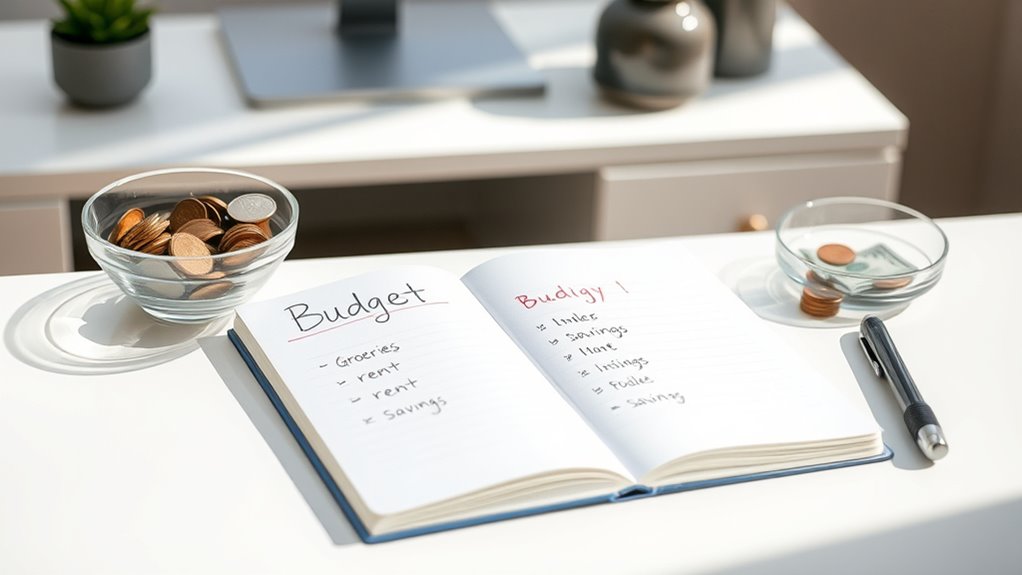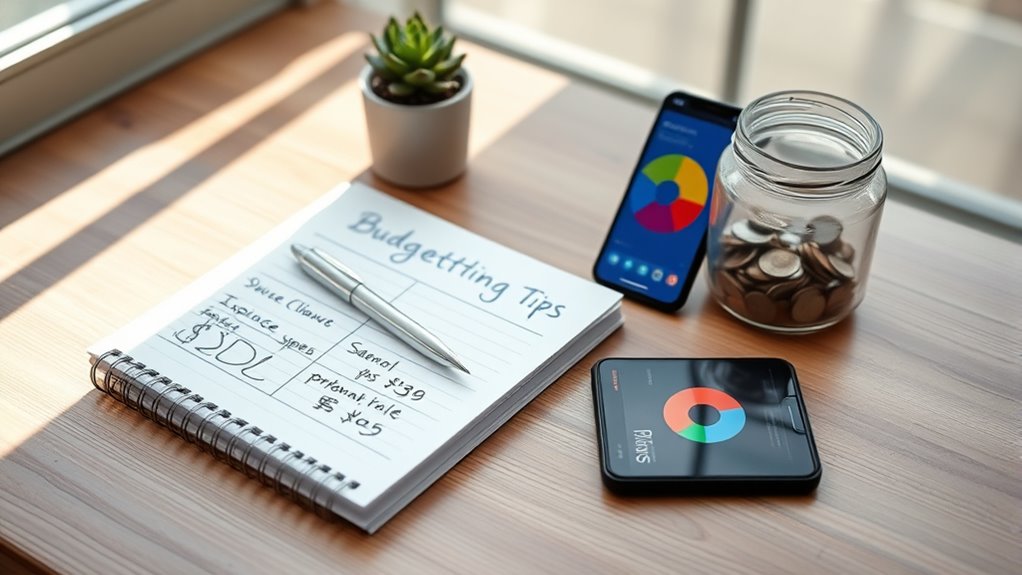To keep your finances simple, start by knowing exactly what you earn and spend each month. Set clear goals that are achievable and stay flexible to adjust as needed. Track your expenses regularly to see where your money goes, and use a straightforward method like the 50/30/20 rule to organize your spending and savings. Always prioritize saving first before spending. If you keep these tips in mind, you’ll build a healthy budget that adapts with your needs. Keep exploring for more useful insights.
Key Takeaways
- Track all income and expenses regularly using apps or spreadsheets to understand your financial flow clearly.
- Use the 50/30/20 rule: allocate 50% to essentials, 30% to discretionary spending, and 20% to savings.
- Pay yourself first by automating savings before covering other expenses to build an emergency fund.
- Review and adjust your budget monthly to stay aligned with changing income and expenses.
- Categorize expenses to identify spending patterns and make informed adjustments for better financial control.
Know What You Earn and Spend

Have you ever wondered exactly where your money goes each month? Knowing what you earn and spend is the first step toward better budgeting. Start by tracking your income and expenses carefully. Regular bank account reconciliation helps you see where every dollar lands and goes, preventing unnoticed errors or overspending. This gives you a clear picture of your financial flow. It’s also essential for emergency fund planning, ensuring you set aside enough to cover unexpected costs. By understanding your spending habits, you can identify areas to cut back and prioritize savings. Keep a record of all your transactions, whether through a budgeting app or a simple spreadsheet. Being aware of your financial flow is key to making informed decisions and building a secure financial future.
Set Clear and Achievable Goals

To set effective financial goals, you need to identify your priorities and focus on what’s most important. Make sure your targets are realistic so you stay motivated and on track. Clear, achievable goals will give you a solid plan to reach your financial dreams. Additionally, understanding your spending habits can help you create more realistic and tailored objectives.
Define Financial Priorities
Wondering how to make your budget work for you? The key is defining your financial priorities. Start with prioritization strategies that help you distinguish between needs and wants. This clarity makes financial goal setting easier because you focus on what truly matters first. Identify your essential expenses, like housing, utilities, and savings, then allocate funds accordingly. By setting clear priorities, you prevent overspending and ensure your money aligns with your goals. Remember, your financial plan should reflect what’s most important to you, whether paying off debt, building an emergency fund, or saving for a big purchase. When your priorities are established, your budgeting process becomes straightforward and effective, guiding your spending decisions and keeping you on track toward achieving your financial goals. Incorporating financial literacy can further empower you to make informed decisions and optimize your budget.
Set Realistic Targets
Once you’ve identified your financial priorities, the next step is to set clear and achievable goals. This is where goal setting plays a vital role in maintaining financial discipline. Be realistic about what you can accomplish within your budget and time frame. Break larger goals into smaller, manageable steps to keep yourself motivated and focused. Avoid setting overly ambitious targets that might lead to frustration or setbacks. Instead, aim for steady progress, celebrating small wins along the way. Clear targets help you stay accountable and make it easier to track your progress. Remember, the key to successful budgeting is consistency, so set goals that challenge you but are still within reach. This approach keeps you motivated and reinforces good financial habits. Incorporating milestones into your goal plan can help you measure progress effectively and boost your confidence as you achieve each one.
Track Your Expenses Regularly

To stay on top of your budget, you should record your daily spending without fail. Using budget apps can make tracking easier and more accurate. Regularly reviewing your expenses helps you identify areas to save and stay aligned with your financial goals. Incorporating tuning modifications into your vehicle can also be a way to optimize performance and enjoyment.
Daily Spending Records
Tracking your daily spending is essential to understanding where your money goes and identifying areas where you can cut back. When you record each expense, you gain a clear picture of your cash flow and can see patterns over time. It helps you stay aware of your spending habits and guarantees you’re sticking to your budget. By categorizing expenses—such as food, transportation, and entertainment—you can identify which areas eat up most of your money. This process makes it easier to adjust your habits and prioritize saving. Consistently recording your daily expenses keeps your financial goals in focus and prevents overspending. It’s a simple, effective way to take control of your finances and make smarter, more informed decisions about your money every day.
Use Budget Apps
Have you considered using budget apps to streamline your expense tracking? These apps help you monitor your spending in real-time and keep your finances organized. They often include features like automatic expense categorization, budget goal setting, and alerts for overspending. By tracking your expenses regularly, you gain better insight into your financial habits and can adjust accordingly. Using an app makes it easy to assign expenses to specific categories, helping you see where your money goes. Plus, many apps sync across devices, so you can update your budget anytime, anywhere. With the right app, you stay on top of your finances, avoid surprises, and make smarter money decisions. Properly managing your money can also reduce the need for costly financial tools and help you maintain a healthy budget. Take control and simplify your budgeting process today with a user-friendly app.
Use a Simple Budgeting Method

Using a simple budgeting method makes managing your finances straightforward and less overwhelming. One effective approach is the 50/30/20 rule, which divides your income into clear categories. Allocate about 50% to essential expenses, including rent, utilities, and groceries, based on your cash flow. Next, assign 30% to discretionary spending like entertainment or dining out. The remaining 20% should go toward savings or debt repayment. This method keeps your expense categories organized and easy to track, ensuring you don’t overspend in any area. By sticking to this simple structure, you gain better control over your money without complicated calculations. It’s a flexible way to see where your money goes and make adjustments as needed, keeping your budgeting process clear and manageable. Clear expense categories help you stay focused on your financial goals.
Save First Before Spending

To build a solid financial foundation, it’s essential to prioritize saving before spending. By paying yourself first, you guarantee you can handle unexpected expenses and avoid debt. Start by building an emergency fund with a small, manageable goal—aim for at least three months’ worth of living expenses. Once that’s in place, focus on debt repayment to reduce financial stress. Making saving automatic helps you stay consistent and prevents temptation to spend. Remember, saving first isn’t about depriving yourself; it’s about securing your future. Proper financial planning can help you make informed decisions about your savings and expenses.
Review and Adjust Your Budget Monthly

Why is it important to review and adjust your budget monthly? Regularly checking your budget helps you stay on track with your financial goals. It allows you to identify if you’re meeting your investment strategies or if adjustments are needed. Maybe your income has changed, or you’ve paid off some debt, so reallocating funds could improve your debt management or boost savings. Life is unpredictable, and expenses can vary month to month. By reviewing your budget, you can catch overspending early and make informed decisions. Adjustments might include cutting unnecessary costs or shifting money toward investments. This ongoing process keeps your financial plan realistic and effective, ensuring you remain in control of your money and are working toward your long-term goals. Incorporating industry trends into your review process can help you adapt to changing economic conditions and maximize your financial health.
Frequently Asked Questions
How Often Should I Update My Budget?
You should update your budget at least once a month, especially during your tracking frequency check-ins. Regular updates help you stay on top of your spending and income changes. If you notice discrepancies or your financial situation shifts, use adjustment strategies like reallocating funds or cutting unnecessary expenses. Consistent updates make certain your budget remains accurate and effective, making it easier to meet your financial goals.
What Tools Can I Use for Budgeting?
Think of budgeting tools as your financial GPS. You can navigate your finances with digital apps like Mint or YNAB, which track expenses automatically and set goals. Or, if you prefer a personal touch, paper planners let you sketch out your budget manually and stay connected to your spending habits. Whichever you choose, these tools help you steer your money wisely and reach your financial destination with confidence.
How Can I Handle Unexpected Expenses?
When unexpected expenses arise, you should rely on your emergency fund to cover costs without stress. Keep track of your expenses regularly to identify potential surprises early. If you don’t have enough saved, re-evaluate your budget and cut non-essential spending temporarily. Building an emergency fund and maintaining diligent expense tracking help you stay prepared, ensuring that sudden costs don’t derail your financial stability.
What if I Overspend One Month?
If you overspend one month, don’t panic. Review your spending tracker to identify where you went over budget, then adjust your next month’s plan accordingly. Use your emergency fund if needed for urgent expenses, but aim to replenish it quickly. Cutting back on discretionary spending and staying disciplined helps you recover financially. Remember, consistent tracking and saving make it easier to bounce back from overspending.
How Do I Stay Motivated to Stick to My Budget?
Did you know 60% of people find it hard to stay motivated? To keep your saving habits strong, remind yourself of your financial goals regularly. Break them into smaller milestones and celebrate each win. Visualize your progress, like a growing emergency fund or a dream vacation, to stay inspired. Keep tracking, stay committed, and remember that every small step gets you closer to your financial dreams.
Conclusion
So, there you have it—simple tips to keep your finances in check. Because who needs complicated spreadsheets or financial wizardry? Just know what you earn, spend wisely, and review your budget monthly. It’s not rocket science, after all. If you can’t manage that, maybe your money’s better off running wild. But hey, at least you’ll have a good story for why you’re broke—“I was just too busy having fun.”









